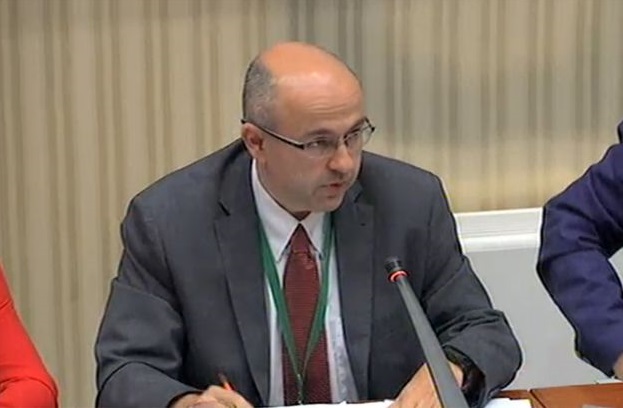29/01/2016
Sergio Nasarre is invited by the European Commission to the Conference on Covered Bonds
On 1 February Sergio Nasarre participated in the Conference on Covered Bonds in Brussels. He was invited by the Directorate-General for Financial Stability, Financial Services and Capital Markets Union of the European Commission to give a presentation, during which he reported on the advantages of harmonising covered bonds across Europe

On 1 February Sergio Nasarre participated in the Conference on Covered Bonds in Brussels. He was invited by the Directorate-General for Financial Stability, Financial Services and Capital Markets Union of the European Commission to give a presentation, during which he reported on the advantages of harmonising covered bonds across Europe
Sergio Nasarre, professor of Civil Law and director of the URV’s Housing Chair, spoke during the third session of the Conference, when he gave a talk entitled ‘A more integrated covered bond framework? Assessing the options on the advantages of harmonising covered bonds in Europe’. Even though covered bonds are a very robust financial product, some have still been negatively impacted by the economic crisis, as is the case with Spanish covered bonds. As a result only few countries are currently issuing them.
Mortgages represent over 50% of European GDP and they are still a non-harmonised area; consequently, harmonising covered bonds would be an important step in achieving a real common mortgage market across Europe. The harmonisation of covered bonds may ease the negative consequences of another mortgage crisis.
Covered bonds are a mechanism that originated in the 18th century as a way to refinance credit institutions so that they could more affordable mortgage loans. Their appeal lies in the fact that they are reliable values and they are supported by a mortgage pool, withheld by the credit institution, in sharp contrast to dangerous mortgage back securities (MBS), which caused the financial crisis to spread so quickly in 2007. Since they were first designed in Silesia, no covered bond has ever been subject to default in Europe.
A Europeanised mortgage market would facilitate cross-border mortgage lending and competition between credit institutions. This would be beneficial to consumers (e.g. a Spanish person would be able to apply for a mortgage to buy a house with a Lithuanian bank, if the latter offered him the same or better conditions, guarantees and protection) and it would make it more difficult for financial abuses to occur. Given these advantages, the European Parliament is currently investigating the causes as to why so few cross-border property sales take place. Spain is among those countries with the highest number of foreign buyers, most of whom are from the UK; however, this is not the case in other countries. For example, whereas in the period 2010-2012 64,000 foreigners purchased a property in Spain, in the same period, only 1,776 foreigners purchased a property in Finland, most of these being Russians. The lack of a common mortgage market is significantly affected by important differences in the land, property and employment laws in the various member states.
Moreover, the initiative to harmonise covered bonds is closely related to two other aspects of the mortgage market that have undergone considerable harmonisation in recent years, namely consumer protection and the single supervisory mechanism.
More news about: Covered Bonds, European Commission, UNESCO Housing Chair
